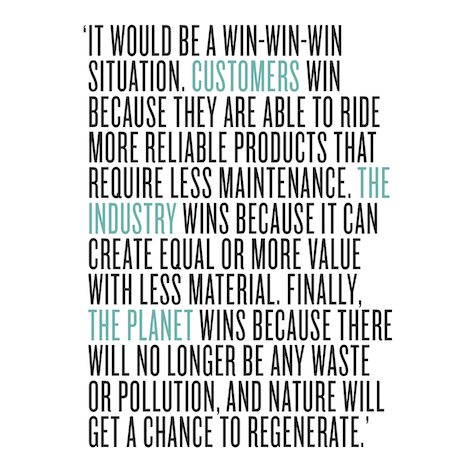Erik bought his first mountain bike, a Gary Fisher Big Sur, in 1997 and was hooked to cycling immediately. He studied Civil Engineering at Delft University of Technology, joined the student cycling club full of like-minded bike nerds. On Saturdays he worked in a bike shop on to be able to buy new bike parts to tune his bikes. His modest racing career peaked when he finished the mountain bike Transalp Challenge in 2004.
As an engineer, Erik worked on track replacement in the London Underground for a few years. He then became an innovation project manager at a large construction company in the Netherlands.
Since 2009, he has been working on sustainability projects, first as an employee, then as a self-employed project manager supporting both corporates and start-ups with his project management skills and knowledge about technology and sustainability.
Founding Circular Cycling in 2018 proved to be the best way to learn about how a circular economy could really work, and Erik now uses this knowledge to train companies in the development of circular business models and manage their implementation.
Erik is a board member of the non-profit Shift Cycling Culture.
Matthijs’ first real bike was a Cannondale M900 that he fully customised in the 1990s. When Matthijs founded Circular Cycling, his shed was the best source for parts. His passion for (bike) technology made him start a study in Industrial Design at Delft University of Technology, before he switched to Leiden University to study History. Like Erik, Matthijs worked at a bike shop and joined the student cycling club.
Matthijs was lured back into the cycling industry by a large distributor at the time when IT systems became an important factor in the success or failure of brands.
As an IT manager, Matthijs thought out, implemented and integrated a wide variety of front-end and back- end systems. Anything from web shops and API connections, to Warehouse Management and Product Information Systems were part of his portfolio. He was also an active participant in DST, an online database for digital product information exchange within the cycling industry.
He currently works for NIBE, an international organisation that provides tools and consultancy for Life Cycle Analysis and Environmental Product Declarations. At NIBE, Matthijs combines his in-depth circular economy knowledge with his IT expertise.
About Circular Cycling
— Our dream is to ride the ‘bike of the future.’
One that adds nutrients to nature while we ride; a bike built without finite resources and without waste that ends up in the environment.
In 2018, we decided that just talking about how the cycling industry was not picking up this trend was no longer good enough. We decided to act and founded Circular Cycling, a commercial start-up aimed at transforming the industry. Circular Cycling was an experiment to test a few tiny first steps on the road towards a circular economy: we built and sold UpCycles – new bikes made from used parts we found in Boxes in sheds and stores.
UpCycles
Each and every UpCycle was unique, as we had the opportunity (and needed) to mix and match parts and framesets in a way we thought fitted best together. We mounted new handlebars (safety first!), bar tape (someone else’s sweat doesn’t really feel new does it?), cables and comfy 25mm tyres on each bike. Drivetrains were checked for wear and replaced when too little life was left in them. Once finished, the ‘refurbished’ road bikes were offered to consumers for prices some 30%-50% lower than you would pay for a new model with the same ride quality.
We made many mistakes and were in no way a perfect example of a truly circular or sustainable company. We eventually stopped building and selling the UpCycles, because we ran into the limitations of using products that are designed for a linear economy in a circular business model. However, we did learn many valuable lessons about the complexity of the cycling industry. Our experiments showed us how a transformation of the current linear system into a circular cycling industry could look like.
From marginal gains..
To realise our dream of a circular cycling economy, we found that the entire industry needs to change. We share our insights in ‘from marginal gains to a circular revolution‘ because an experiment in a small shop in the Dutch city of Utrecht is not a revolution. For a revolution to happen, small initiatives like ours that are already happening all around the world, need to connect with each other and with new initiatives to create enough momentum to start a revolution on a global scale.


